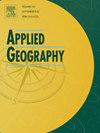解码全球南方非正规工人的心理健康:一个综合的国家-邻里-个人框架
IF 5.4
2区 地球科学
Q1 GEOGRAPHY
引用次数: 0
摘要
COVID-19 的流行凸显了社区和国家环境在影响非正规工人心理健康方面的关键作用,而非正规工人占全球南部劳动力的 90%。然而,现有的研究主要集中于个人层面因素的作用。本研究基于孟加拉国、中国、印度和菲律宾的第一手问卷调查数据,提出了一个综合的国家-邻里-个人框架,以研究主观邻里贫困如何与国家能力相互作用,影响非正规工人的心理健康。结果显示1) 在 COVID-19 期间,全球南部非正规就业者的心理健康状况明显差于正规就业者,这凸显了非正规就业导致的健康不平等。2)非正规就业加剧了主观邻里剥夺感,这反过来又对心理健康产生了负面影响。3)由于国家能力不同,主观邻里剥夺的中介效应在不同国家有所不同。国家能力越强(如中国和菲律宾),其负面影响就越小。本研究表明,在后流行病时代推进可持续发展目标 3(良好的健康和福祉)取决于实现可持续发展目标 8(体面的工作和经济增长)和可持续发展目标 11(可持续的城市和社区)。促进具有包容性和复原力的邻里关系,增强建设性的国家嵌入性,对于改善弱势群体的心理健康和进一步促进健康平等至关重要。本文章由计算机程序翻译,如有差异,请以英文原文为准。

Decoding the mental health of informal workers in the Global South: An integrated State-Neighborhood-individual framework
The COVID-19 pandemic underscores the critical role of neighborhood and national contexts in shaping the mental health of informal workers, a group that accounts for 90 % of the workforce in the Global South. Yet, existing research has largely focused on the role of individual-level factors. Based on first-hand questionnaire data from Bangladesh, China, India and the Philippines, this study proposes an integrated State-Neighborhood-Individual framework to examine how subjective neighborhood deprivation interacts with state capacity in shaping the mental health of informal workers. Results show that: 1) Informal workers experience significantly poorer mental health than formal workers in the Global South during COVID-19, highlighting the health inequalities driven by employment informality. 2) Informal employment exacerbates subjective neighborhood deprivation, which, in turn, negatively affects mental health. 3) The mediating effects of subjective neighborhood deprivation vary across countries due to different state capacities. Higher state capacity (as in China and the Philippines) mitigates its negative impact. This study indicates that advancing SDG 3 (Good health and well-being) in the post-pandemic era is contingent upon fulfilling SDG 8 (Decent work and economic growth) and SDG 11 (Sustainable cities and communities). Promoting inclusive and resilient neighborhoods and enhancing constructive state embeddedness are vital for improving the psychological well-being of vulnerable groups and further fostering health equality.
求助全文
通过发布文献求助,成功后即可免费获取论文全文。
去求助
来源期刊

Applied Geography
GEOGRAPHY-
CiteScore
8.00
自引率
2.00%
发文量
134
期刊介绍:
Applied Geography is a journal devoted to the publication of research which utilizes geographic approaches (human, physical, nature-society and GIScience) to resolve human problems that have a spatial dimension. These problems may be related to the assessment, management and allocation of the world physical and/or human resources. The underlying rationale of the journal is that only through a clear understanding of the relevant societal, physical, and coupled natural-humans systems can we resolve such problems. Papers are invited on any theme involving the application of geographical theory and methodology in the resolution of human problems.
 求助内容:
求助内容: 应助结果提醒方式:
应助结果提醒方式:


